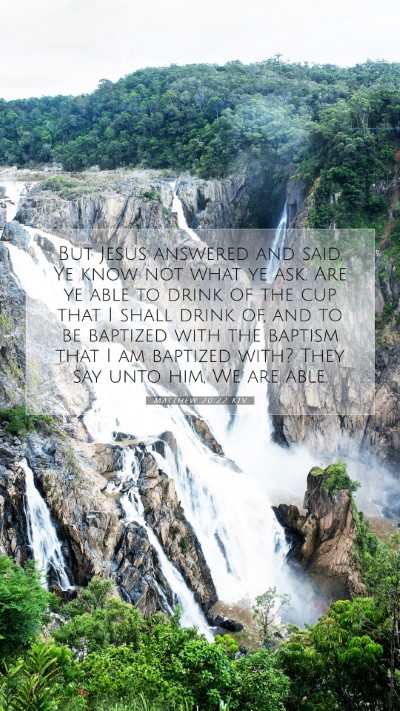Bible Verse Meaning of Matthew 20:22
Matthew 20:22 states: "But Jesus answered and said, You do not know what you ask. Are you able to drink the cup that I am about to drink, and be baptized with the baptism that I am baptized with?" This verse encapsulates profound themes of suffering, discipleship, and the nature of Jesus' mission. Below, we delve into interpretations and insights from various public domain commentaries.
Overview of Matthew 20:22
This scripture occurs during a conversation between Jesus and the mother of James and John, who requests prestigious positions for her sons in Jesus’ kingdom. The response of Jesus draws attention to the significant misunderstanding of what true greatness in the kingdom of God involves.
Commentary Insights
-
Matthew Henry: Matthew Henry emphasizes that the request made by the mother shows a lack of understanding of what it truly means to follow Christ. Jesus' reply highlights that greatness in His kingdom is not about authority and privilege but about suffering and sacrifice. The 'cup' refers to His impending suffering and death, indicating that discipleship involves sharing in the suffering of Christ.
-
Albert Barnes: Barnes focuses on the metaphor of the 'cup' and 'baptism' that Jesus employs. The 'cup' symbolizes the trials and tribulations He would endure - a test of the disciples' commitment. The 'baptism' refers to the overwhelming experience of suffering, arguing that Jesus conveyed the seriousness of following Him and the inevitable challenges disciples would face.
-
Adam Clarke: Clarke provides historical context, explaining that the 'baptism' Jesus refers to signifies His passion and the circumstances leading up to His crucifixion. He stresses the importance of understanding the true nature of greatness in the eyes of God—not the human pursuit of glory but the willingness to serve and endure hardships for the sake of the gospel.
Understanding the Cup and Baptism
In biblical terms, the 'cup' often represents God's judgment or suffering. Jesus speaks to the necessity for His followers to be prepared for similar trials. The 'baptism' involves being immersed in suffering and challenges that align with the call of discipleship.
Key Themes
- Discipleship: True discipleship is characterized by a willingness to suffer and serve.
- God's Kingdom: The nature of greatness in the kingdom is rooted in humility and sacrifice.
- Preparation for Trials: Followers of Christ must prepare for challenges that come with their commitment to Him.
Application of Matthew 20:22
Understanding the essence of this verse encourages believers to reflect on their own desires for recognition and glory. It calls for an introspective examination of what it means to truly follow Jesus and share in His mission, particularly in the face of adversity.
Practical Lessons
- Prioritize servanthood over seeking authority.
- Prepare for the inevitable trials that come with faith.
- Recognize that true strength lies in suffering for the gospel.
Cross References
- Luke 22:42 - Jesus praying in Gethsemane, reflecting on His 'cup' and submission to the Father's will.
- John 15:20 - Addressing the relationship between suffering and following Him.
- Mark 10:38-39 - A parallel account of the request and Jesus’ response about drinking the cup and baptism.
Additional Insights from Commentaries
By examining various commentaries, readers gain a holistic understanding of not just the verse itself, but its broader implications for faith and practice.
Conclusion
Matthew 20:22 offers deep insights into the expectations of discipleship, challenging believers to adopt an attitude of humility and readiness for suffering. The teachings encapsulated in this verse resonate throughout Scripture, reminding us that following Christ means entering into His sufferings for the sake of the gospel.


